✍️ Last modified on April 10, 2023
In this comprehensive guide, we will reveal everything you need to know about keyword research. Once you read it, you’ll know exactly :
- What is a keyword;
- How to find them easily and quickly;
- How to choose the best keywords in your natural referencing ;
You’ll also discover some little-known techniques to help you target the right keywords. This will attract the “right visitors” to the “right pages” to increase the profitability of your site!
Are you ready? So take advantage of this complete guide now…
Join 10,000+ makers and get all our latest tips for making a living from Blogging and Affiliate Marketing.
Contents
The keyword in referencing
Before we tell you the best strategies for searching and sorting keywords, we need to know what they are.
What is a keyword?
It is a word or a group of words typed by the Internet user when he wants to make a search on Google in particular. They are also called “query” in SEO.
This query can be typed or dictated since there is now voice search(ok Google!). For your information, 3.1 billion voice searches are performed each month worldwide.
For example, if you came across our site while browsing on Google, you typed in “keyword search” or something like that. There is no such thing as chance on the Internet!
What is it for?
Everyone uses the keyword more or less consciously:
- The user types or dictates a keyword to specify his search on Google.
- The site editor takes it into account to create a page bringing its answer to it.
- And the search engine sorts through all its pages to offer the best answer(according to it) to the Internet user.
Imagine yourself in a bookstore. You go to the bookstore(Google) to ask for the “best horror book of the moment”(keyword) and he suggests you such or such book(search results).
Let’s take a more concrete example: the query “danger cryptocurrency“.
The Internet user who types in this query is looking for information about the disadvantages of digital currency. He probably wants a list of all the risks of this one and maybe a comparison with the official currencies.
Take the test and you will see many sites offering their own answer.

And Google’s job will be to rank all the answers proposed by the site editors in order to propose the most suitable one to the user.
And this hierarchy is very important to him. Because if the user is satisfied, he will come back to do other searches on Google. Now you understand why other search engines like Bing have almost disappeared today!
Why is keyword research important?
This is the first step in creating a website. You need to make a list of keywords and then think of a logical structure, write a page that answers each of them, promote your content, set up your netlinking etc.
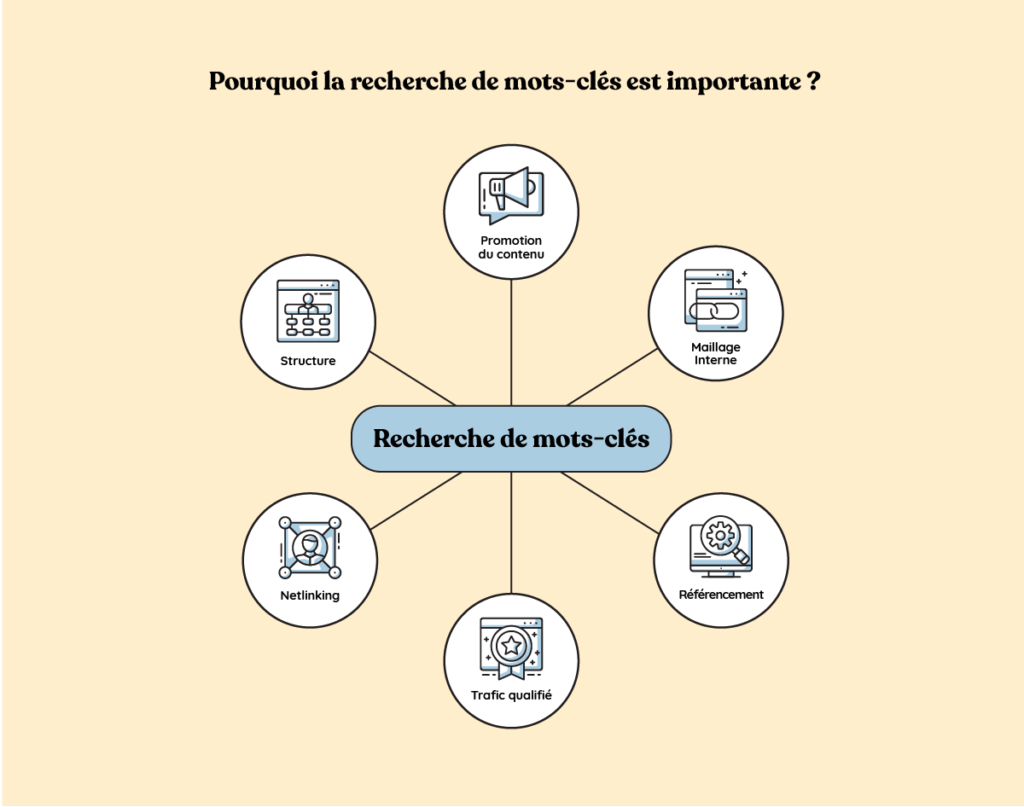
This is the foundation of your project. It is therefore vital not to miss it or everything will collapse! The only exception so far is the Tower of Pisa.
Moreover, you can estimate the number of visitors that your site will receive in the long term thanks to the keywords. In fact, each of them is typed a certain number of times every month.
Let’s do the test with the keyword “cryptocurrency” :

According to the Ubersuggest tool, this query is searched 40,500 times per month in France. So if you rank in the top search results through SEO you will be able to attract some of those users to your site. All without paying a cent.
All you have to do is monetize your traffic. Whether it’s with affiliation to platforms allowing you to buy cryptos or simply your own training to become a trader for example.
As you can imagine, forgetting keywords is :
- Missing many visitors to your site;
- Do not address certain aspects of your theme that could be important;
- Leave the field open for your competitors to grow;
As Abraham Lincoln said, “66% of success comes from preparation of a project“. So don’t miss this step!
What about spelling mistakes?
As the words are typed by Internet users, some typing or spelling errors may slip into the query. So you can find keywords that are misspelled.
In this case, always choose the right handwriting. It may seem counterintuitive, but Google will still highlight your page if you use the right semantics.
In addition, it will avoid looking like a painter if you allow us this expression! Especially if you spell “Happy Birthday Harry” like Hagrid on his cake…
Let’s take the example of crypto with Jean-Boomer who types “cripto” on Google. We don’t make fun, we have to start well. According to the Ubersuggest tool, this keyword is typed 880 times per month in France. Oh yes, it is.

But in the end, would you trust a site that can’t even write its subject correctly? Would you buy a product or service offered by this one? Would you recommend it to your friends and family?
The answer is no. Or maybe you’re really weird, but at Makers we accept you as you are. As McDonald’s used to say, “come as you are“! 🙌
Let’s move on to the…
7 methods to find keywords
How to find keywords? This is a very important question for the niche site editor in you.
There are many tricks and we will give you the 7 best ones to make your search as efficient as possible.
1 – Intuition
The first step is to sit behind a blank sheet of paper and think about your topic. This is very important to do because you will be able to write down all the words that come to mind and only then refine your search.
This is the starting point that will allow you tohave a good base before using the different SEO tools available on the Internet.
Let’s take the example of cryptocurrency again.
We could list words, questions or even expressions that come to mind:
- Is it risky?
- How to buy it?
- Who accepts bitcoin payments?
- How to protect them?
- Can we get hacked?
- How does it work?
- Etc.
If you have these questions in mind, there are bound to be others who do as well. And if you answer them through your articles, you will bring value to your visitors. This creates a relationship of trust with them, which is important to make a website profitable.
2 – Google Suggest
When you start typing a word on Google, it automatically suggests different words. In fact, this search engine completes your query with different suggestions based on what people usually type.
The idea is to save you time. And what’s great is that it’s a source of keywords for you. If these queries are proposed by Google, it is because they are common enough to be highlighted.
Look at the example of the word “crypto“:
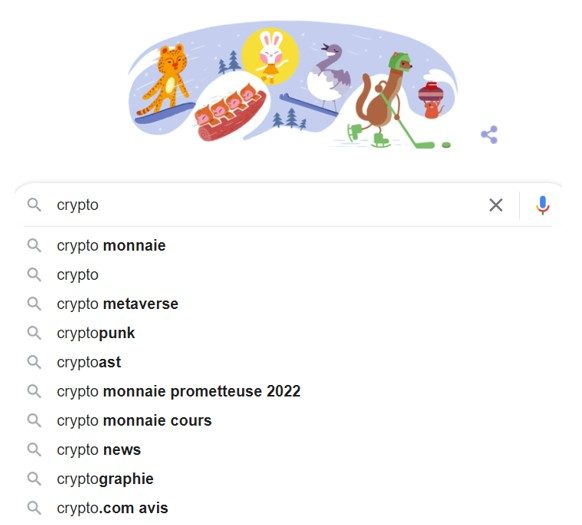
And you can have fun doing the same thing again, taking each suggestion to multiply your keywords. Let’s take “crypto metaverse” which has just been suggested by Google for example:
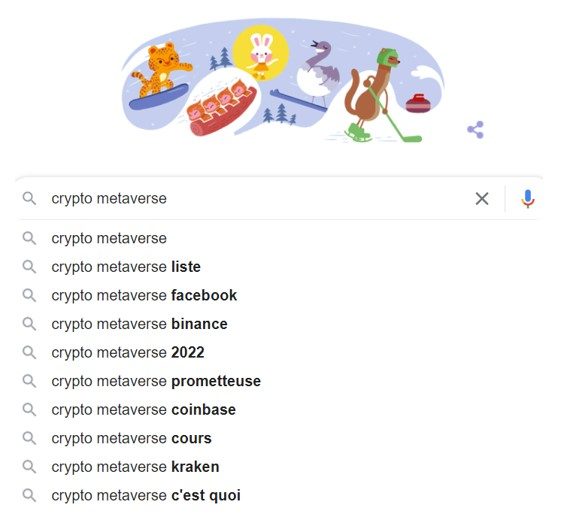
That’s another ten or so new keywords. It sounds like magic as a certain Hogwarts professor would say.
What could be better than searching for keywords directly at the source? At least, you are sure that these are search queries on this search engine. And it’s an inexhaustible source of ideas!
3 – Related research
When you have done a search on Google, this search engine offers you several results. And if you go to the bottom of the page, you have what is called “related searches” to refine your search.
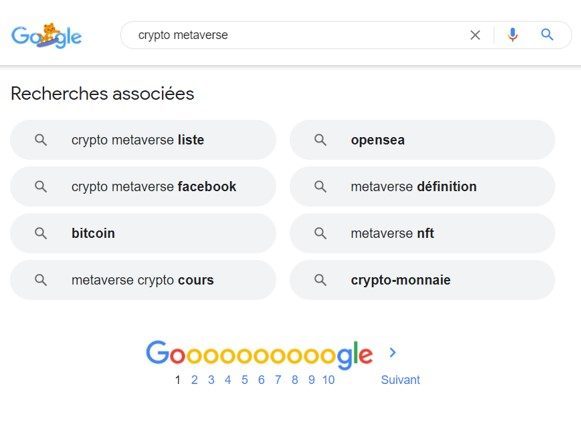
You can even find in the middle of the page the box “Other questions asked” which proposes you other searches:
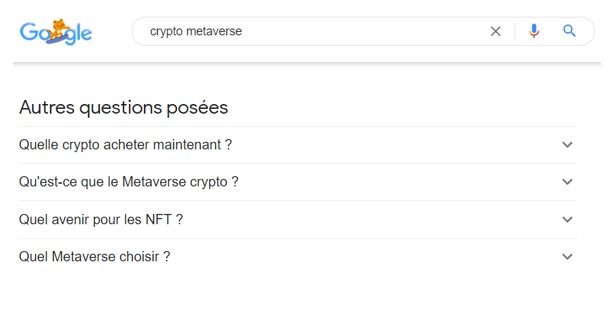
To discover all the related searches for all the keywords you have already found. These are obviously interesting keywords. With this, you will multiply your database! Free and easy.
4 – Audit of the competition
The technique that is used a lot by SEOs is to rely on competitors. You can use some online tools to extract all the keywords on which your competitors are positioned.
This way, you already have a base to build on. Then you have to add to it to make sure they haven’t forgotten anything. What to do better than them in the end! For the anecdote, this is the technique that was implemented by Google to replace the Altavista search engine… Which itself had done this technique to replace Lycos. In short.
The easiest way is to note little by little during your research the sites that are placed on the keywords that interest you. Then you can audit each of them to get as much data as possible.
For example, for the query “crypto currency reviews” we can see this site which is well placed:

Then, you just have to put the URL of this site in Ubersuggest for example to get all the information on it:
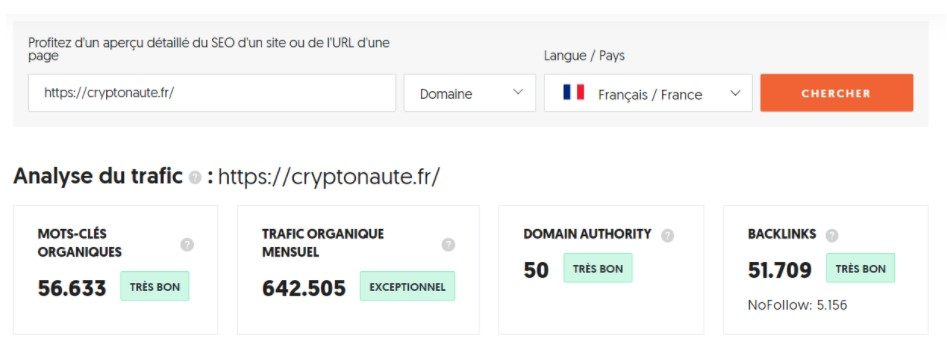
As you can see, this site is positioned on 56 633 keywords. It is what is called an authority site, meaning that it has hundreds and hundreds of pages. If you’re just starting out, you’ll have to target much smaller, of course.
But it was a good way to show you that you can get a lot of data on the competition. You just have to click on the “organic keywords” box to get them all, nothing could be easier!
5 – Forum
It is true that social networks have gradually made forums disappear. But lucky for you, the big ones still exist. Every day, Internet users come to ask questions or give tips on the topic that interests you.
We invite you to look for one or more forums themed in the field you are targeting. For example, if we type “cryptocurrency forum” we get :

And as you can see, these forums are often well organized. This will give you inspiration for your sites and above all, it will help you discover new keywords or questions that people are looking for.
Look for example at the cryptofr forum:

This can help you anticipate the structure of your site. Here we can see that crypto involves trading, but also mining. Having a category reserved for beginners can be nice for them.
This is an opportunity for you to see the popularity of certain topics. On this picture, we can see that more than 16000 messages are exchanged in the mining part against 3600 for trading. So there is something to do here!
6 – The keyword generators
There are many free and paid keyword generators. However, we advise you to choose a paid one, because you will be able to obtain a lot of more precise information.
To show you how these generators work, we will use Ubersuggest which is one of the cheapest on the market. Let’s type the keyword “metaverse” for example:

The search volume corresponds to the number of times this keyword is typed in France each month.
The higher the amount, the more visitors you can attract to your site if you are well placed. Obviously, the competition will be tougher.
CPC stands for “cost per click”, it’s not something that concerns you. This is the average cost advertisers pay for each click when they pay for advertising.
On the other hand, it allows you to realize the economic potential of the keyword. The higher the CPC, the more profitable this word is.
Concerning the difficulties in SEO and paying, we will come back later. For the moment, it is not important.
If you go a little further down the page, you can see the trend of this keyword:
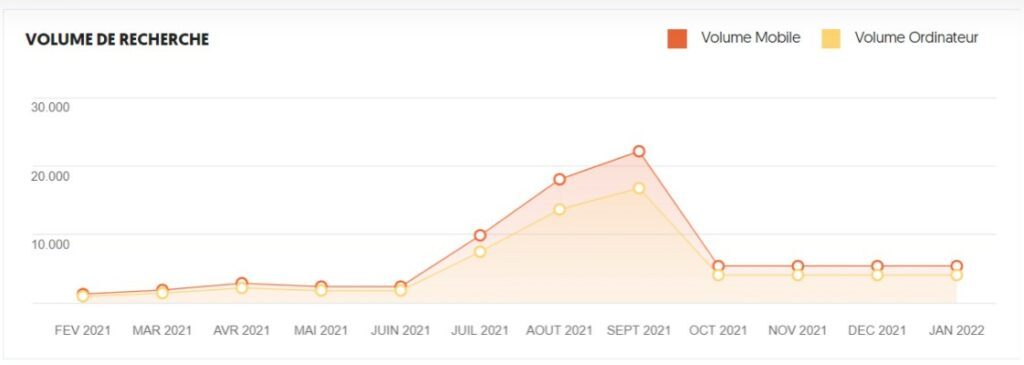
As you can see, the word “metaverse” has been searched a lot during the summer of 2021. This was probably thanks to Facebook that started teasing its name change about it.
On average, this query is still searched 6000 times each month.
And if you go even further down the dashboard, you’ll be able to discover lots of keyword suggestions related to this one. The best part is that you also have the search volumes, which is important information as you will soon see:
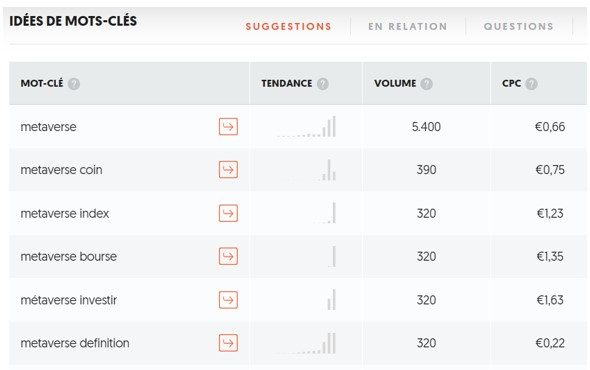
Of course, keyword research becomes very easy with this kind of tools!
If you can’t afford to spend a few bucks a month on such tools, you can use Keyword Shetter. It is a completely free site that allows you to get hundreds of keywords from a query:
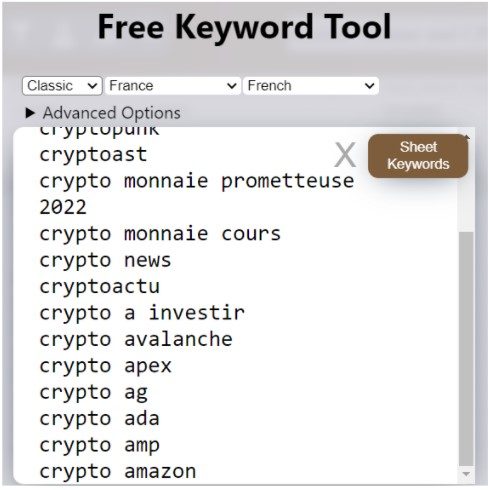
However, you only get the words and not the volume or anything else. It can tide you over until you invest in a more powerful tool.
7 – Using Google Search Console
You can discover great unknown keywords through Google Search Console. But for this, you must have already made your site and your page is referenced on social networks.
Indeed, you can search what keywords are typed by Internet users to see your proposed page. Thus, you can improve the semantics of your page by answering better or by integrating sub-parts in your articles on it.
This is a great way to optimize your content!
How to classify the keywords between them?
Each keyword has its own particularities. Depending on how you want to analyze them, you can classify them differently. This will allow you to make a selection before choosing the best ones for your site.
Long tail and short tail queries
This difference is often used in natural referencing.
Definition : short tail query
The short tail query consists of a single word that is therefore general and highly searched on search engines.
The long tail query represents a group of several very specific words that do not necessarily have a large search volume.
To give you an idea, “cryptocurrency” is a short tail query compared to “bitcoin creation history” which is a long tail query.
The 3 differences between short and long tail
- The long tail is easier to reference: as the request is very precise, fewer sites are likely to respond to it.
- The short tail has a higher search volume: you can therefore attract many more visitors to your site if you manage to be well referenced on it.
- The long tail is more profitable in the short term: you will get your first results with it so it is better to prioritize it at the beginning. On the other hand, the short tail is still very profitable in the long term so you should still take it into account in your strategy.
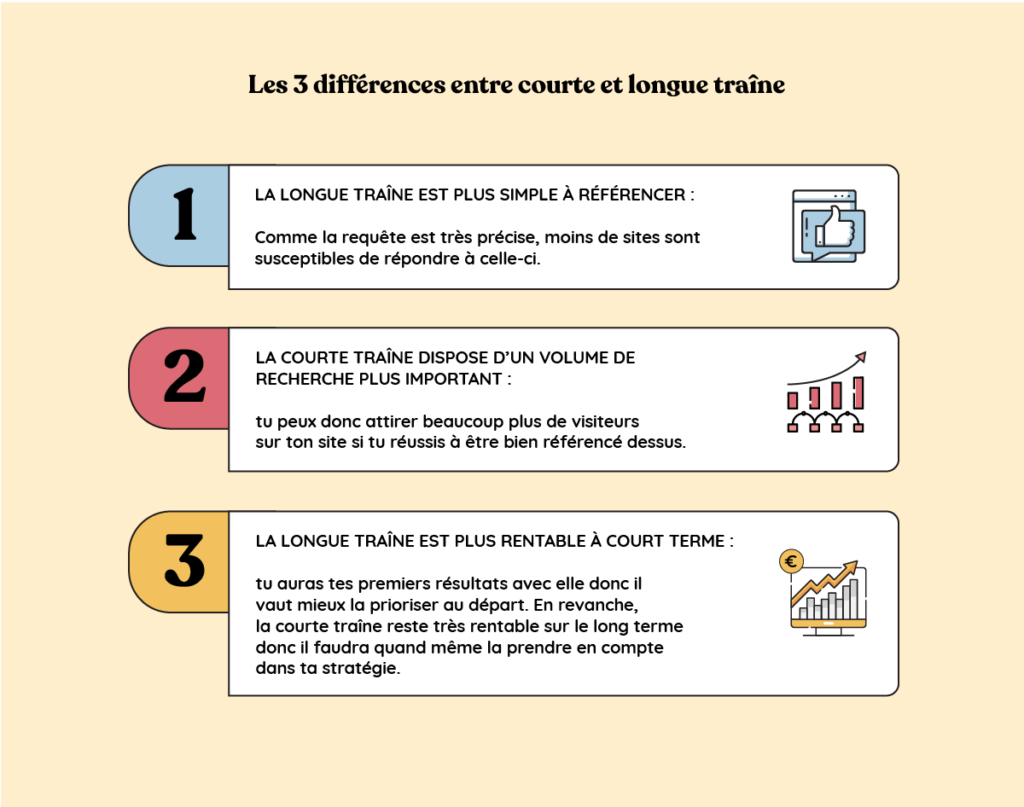
How to use them in practice?
As part of an SEO strategy, it is advisable touse long tail queries to reinforce short tail queries.
Let’s go back to our “crypto currency” example. Let’s assume that we only use the keywords proposed by Google Suggest:
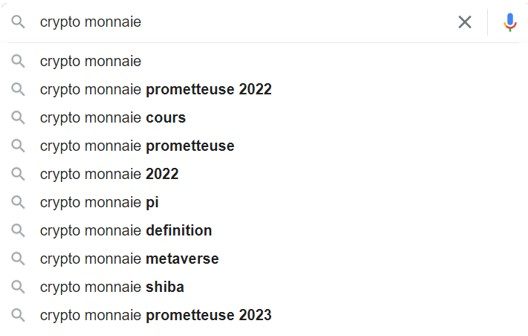
Here you can see 9 different proposals and each one should link to the short tail “crypto currency” to strengthen it. In other words, 9 articles will be written and will also reinforce the one written on the short tail query by making an internal link to it.
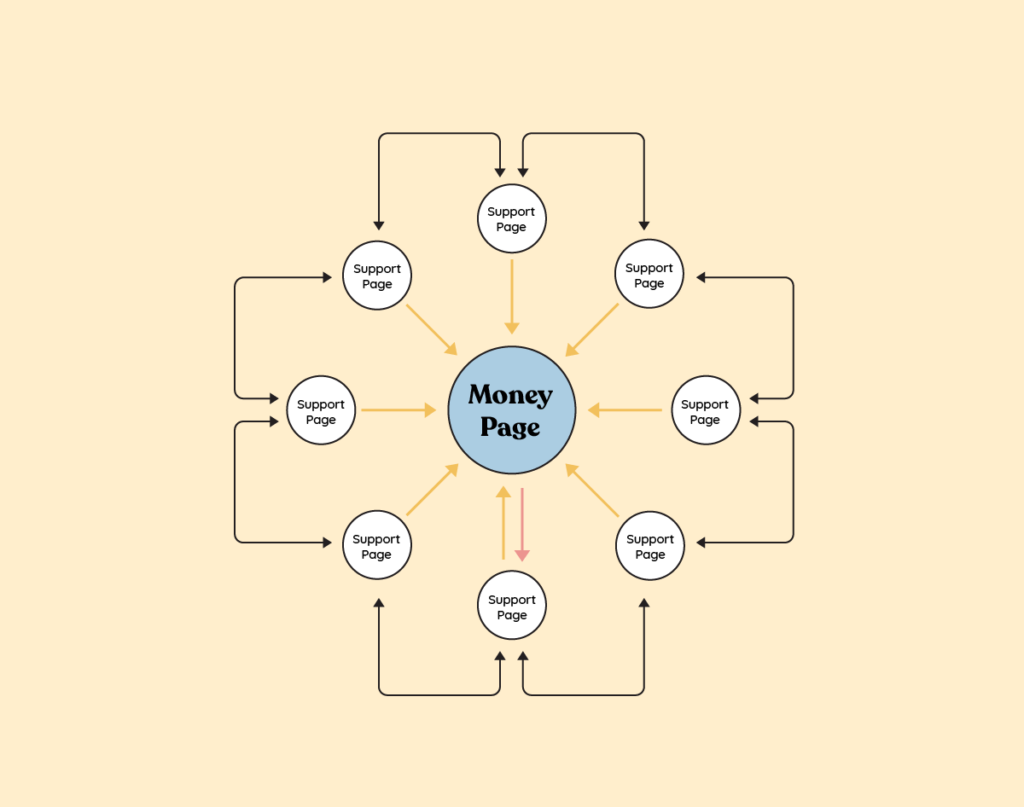
Just remember that a link ( whether internal or external ) is like a recommendation. And the more you have, the more Google understands that you are good at what you do. It’s even better if the sites that recommend you are reputable too.
We’ll talk about it in more detail in a dedicated guide, but this will give you a better idea of what you can do with it!
Taking into account the research intention
You can also rank keywords according to search intent, which is more of a marketing criterion than a purely SEO one.
Informational or transactional?
You have to ask yourself if theintention behind the keyword is informational or transactional. Is the user just looking for information or does he want to make a transaction?
Let’s get down to business with crypto-currencies.
Regarding informational keywords, we can mention :
- “Cryptocurrency history”
- “Danger cryptocurrency.”
- “Cryptocurrency Revolution”
As you can see, the Internet user is just looking for information or clarification. At no time is he looking to buy anything.
Concerning transactional keywords, we can mention :
- “buy bitcoin”
- “protect cryptocurrency”
- “best cryptocurrency”
Here, the user is looking for a way to buy bitcoin, so you can explain the procedure in detail and offer as an affiliate a service that allows him to buy bitcoin securely.
In the second case, he is looking for a way to protect himself, so you can explain the positive aspects of a ledger key and offer him a model in affiliation.
In the third case, looking for the best cryptocurrency is a sign that the person is close to taking action. You have to present him your ranking with the service where he can get his cryptocurrencies in affiliation.
It is thanks to these words that you will make your site profitable. If you are unsure of the search intent, type the keyword into Google and see what the top-ranked sites offer. You’ll have your answer in less than 2 minutes!
Which keywords should I choose?
Now that you know that transactional keywords are the most profitable, you may be tempted to do only that. But this is not recommended! Far from it.
The right range is to aim for 70% informational keywords and 30% transactional keywords. This is an adaptable range of course.
This will make it possible to appear to Google as a site that deals with a whole subject and that does not ONLY affiliate to other services. This could be penalized in the future so be careful.
So our advice is to couple informational words with transactional words.
If we take our example of cryptos, you can write several articles on the dangers of cryptos when they are left on the exchange platform, the risks of hacking, etc.
And at the end of each article, link to your article that offers a comparison of the best ledger keys to protect his cryptos. The visitor will find it logical and may even buy if he is in need.

This is a good strategy and also offers a coherent internal mesh. We don’t say more, it will be the subject of a future guide!
The hidden face of informational keywords
As you may have understood, informational keywords are used to attract visitors looking for an answer to their question. As a result, they are not supposed to be profitable, which is why some site editors abandon them.
But the truth is, you can earn money and authority with these. Let us explain how.
If you have fun making a glossary giving a short and precise definition of all the weird terms used in the crypto universe, some sites will take these definitions and link back to you.
This is a way to get backlinks naturally without paying anything. And getting these kinds of external links builds your authority. So it’s a very good deal. And it saves you money since you won’t have to pay for these links for example!
You can also put advertisements on your site, especially on informational words. This way you can get money automatically without doing anything.
One of our sites generates about $16 per day for 50,000 visitors per month to give you an idea. Without doing anything!
Finally, you can take the opportunity to collect the email address of your visitors. This will allow you to do email marketing to create a relationship with them and especially sell them your own products or services in affiliation for example.
This is the King Midas SEO technique: attract visitors through SEO and turn them into money through marketing.
How to choose your keywords?
Now that you have a big list of keywords, you’ll have to choose the most interesting ones for you. And for this, you can use SEO criteria but also marketing criteria.
SEO criteria
There are 3 main criteria to take into account when making your choice:
1 – Research volume
The search volume corresponds to the number of times this keyword is typed into a search engine per month in France. You can get it on most keyword generators.
In order to estimate the number of visitors to your site, you should know that :
- 🥇 The site in 1st position will get 56% click-through rate among those searching for this query ;
- 🥈 The site in 2ᵉ position will get 15% ;
- 🥉 The site in 3ᵉ position will get 9% ;
So example with the keyword “crypto” which is searched 74 000 times per month in France :
- The 1st can attract 41,440 visitors to its site;
- The 2nd can attract 11,100 visitors to its site;
- And the third can attract 6,600;
Of course, the higher the volume, the more likely the competition. It will be necessary to estimate whether or not you have the means to exceed it.
2 – Assessing the trend
Some areas have existed since the dawn of time and will continue to do so. One example is affiliation dating earning money or sports.
Others on the other hand can be trendy and then disappear. And there are tools that can help you realize this. You can for example use Google Trends.
Take for example the word “handspinner”:
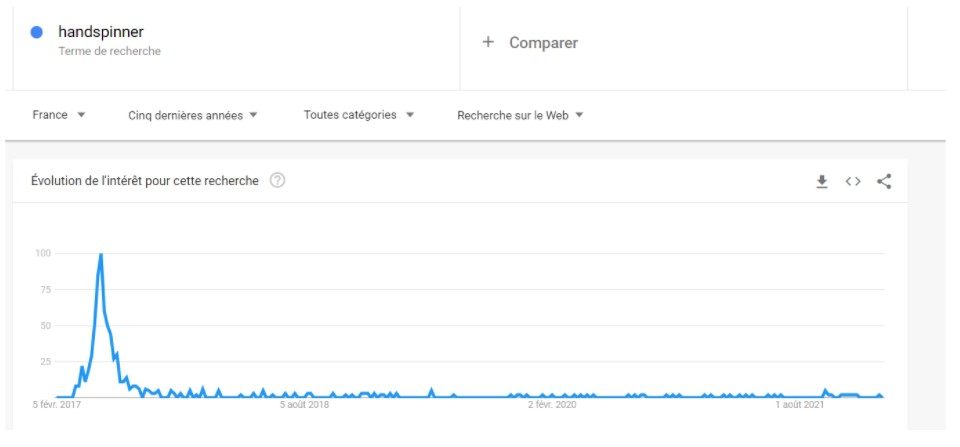
It had a very big buzz in 2017, but since then it’s been quiet. So it may not be a good keyword for you. Long gone are the days when people told you that you had missed your life if you didn’t have a hand spinner!
Maybe ecology will join the hand spinner in the forgotten box once we have solved all the problems of the Earth. Who knows?
You can also see the seasonality of certain keywords. Look what it says about the word “pool“:
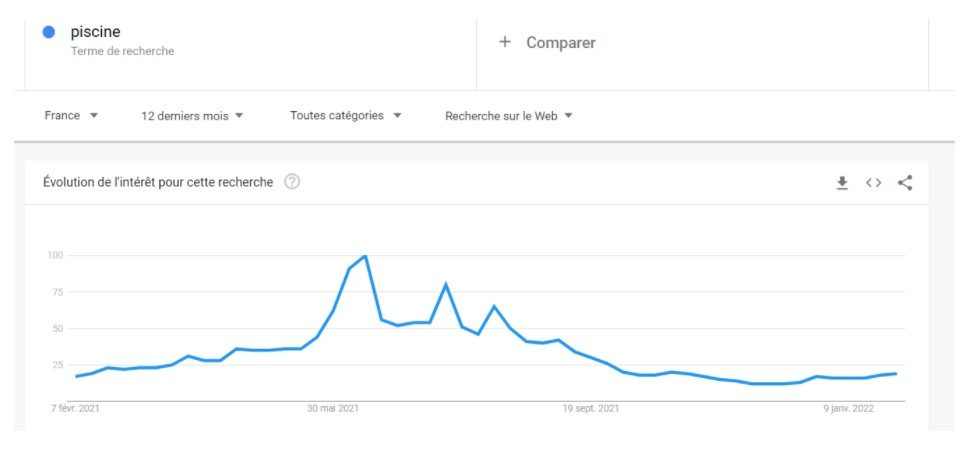
You have here a word that peaks in June, then in July and finally in August. This will inevitably have an impact on your number of visitors so take it into account.
3 – Evaluate the competition
There are three different ways to evaluate the competition. Then you have to couple all the results to evaluate if you can beat it or not.
The first thing is the “keyword difficulty“. It is a data evaluated by theonline tool Ahref that allows you to have a score out of 100 on the difficulty to be positioned in the first positions. It is recommended not to exceed 10, or 5 if you are just starting out.
The best part is that it’s completely free!
With him, you can realize that the word “crypto” is very competitive:

On the other hand, the word “metaverse” is a bit easier to access:

Then, you can use the “allintitle” command on Google which allows you to know how many sites have exactly this request in their title.
As a general rule:
- If you find less than 2000 results: little competition so it will be easy to position yourself
- If you find between 2000 and 5000 results : average
- More than 5000 results: it starts to be complicated
Here is a request for the future where you can largely position yourself:

Finally, you should look at your competitors’ metrics to see how powerful their site is. For this, you can use Majestic which will give you the number of referring domains of your competitors. Basically, these are the number of sites that link to yours.
This will allow you to see how popular the site is.
For example, the cryptonaute site has 1720 referring domains:
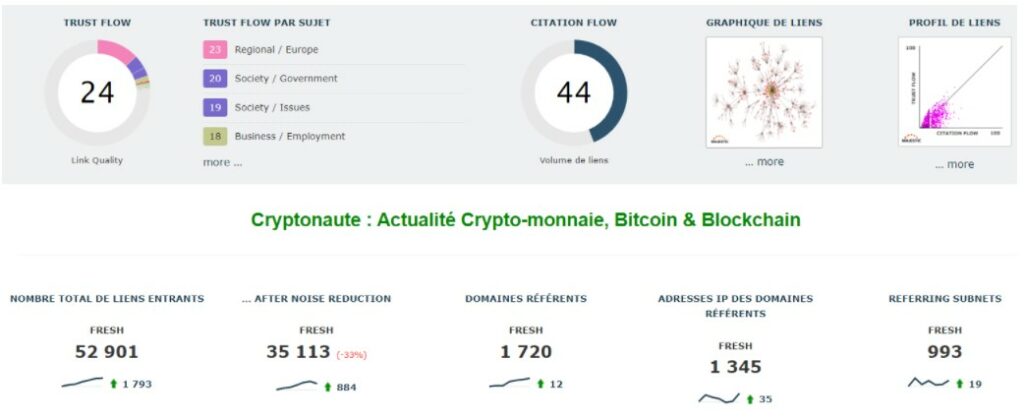
Don’t panic when you see all this information, we will make a complete article for you so that you can understand everything easily.
You don’t need all of this for keyword research, but it does give you a start on the big picture which is always good!
Marketing criteria
Once you have all the SEO criteria in mind, your decision to use the keyword or not should be made based on marketing interest.
- What will this keyword do for you?
- Is it easy to position yourself?
- What will it do for your SEO strategy?
We advise you to first choose your transactional keywords, let’s say about ten.
Then for each of these words, choose 5 or 6 informational words that deal with the same topic. They will be able to internally link to the transactional word that speaks to the same theme. This will also allow you to facilitate the internal linking of your site while having a coherent structure.
By doing so, you would have a site of about 50-60 pages to create. It’s a great way to start.
Les Makers method in a nutshell
Let’s go through each step of the keyword research together so that everything is clearer for you dear apprentice maker!
- Step 1: Choose a theme
- Step 2: Search for keywords with the 7 methods presented
- Step 3: Rank the keywords with all criteria (volume, search intent, difficulty, etc.)
- Step 4: Make a well-proportioned selection between informational (70%) and transactional (30%)
- Step 5: Switch to SEO On Site
But for step 5, this will be the subject of a future guide.
If you have trouble sorting keywords, don’t hesitate to use Google Sheet, a free online spreadsheet. Your ranking could look like this for example:

Remember, the only way to use what you’ve learned is to take action. Because as Anthony Robbins said: ” Action is what creates all great successes. Action is what gets results. “
Here, we think we have succeeded in showing you how to search for your keywords to start on the right track. If you want to stay in touch with the Makers community, we invite you to fill out the form below.
This will allow you to receive an email to know as soon as a content of this kind has been published on the site. Don’t worry, you won’t be spammed, it’s impossible for us to write this kind of article every day!
As a bonus, you will receive many exclusive tips on how to launch your first online business and earn your first money online.
Join 10,000+ makers and get all our latest tips for making a living from Blogging and Affiliate Marketing.



